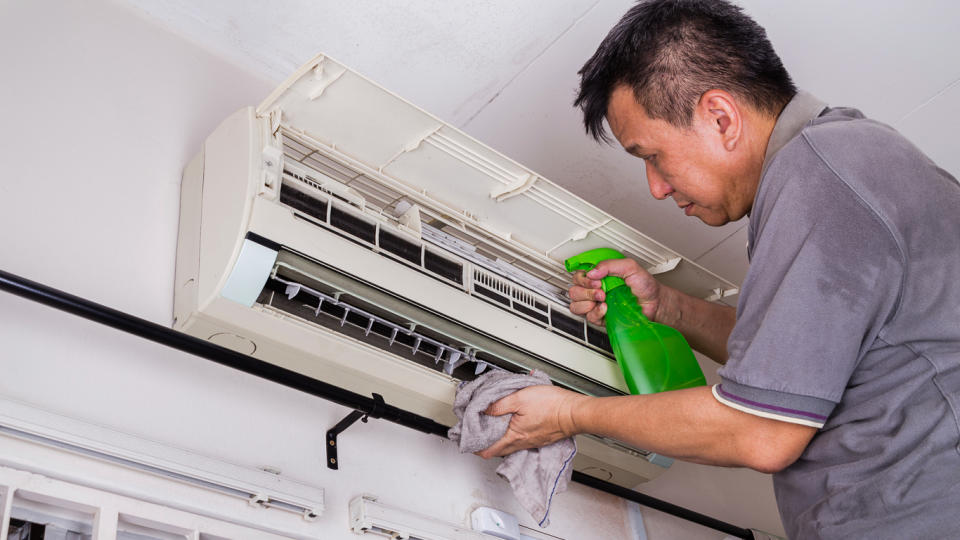8 Things To Do Now To Save on Utility Bills This Winter

Utility bills typically soar in winter, and some U.S. residents can expect especially big hikes in their heating costs this year. The U.S. Energy Information Administration predicts that the 47% of Americans who use natural gas to heat their homes will see a 28% increase in prices this winter.
When GOBankingRates spoke to national home energy efficiency expert and CEO of Arizona-based Elevation Greg Fasullo last year, he recommended that homeowners get an energy audit to pinpoint areas where they can save.
I’m a Financial Planning Expert: 6 Worst Purchases To Make in an Economic Downturn
Discover: How to Get Cash Back on Your Everyday Purchases
“Some utilities companies have programs to cover part or all the costs of an audit,” Fasullo said. “Plus, these audits are now eligible for a tax credit through the Inflation Reduction Act.”
Booking a home energy audit — which can cost anywhere from $100 to $500 — will pay off in the long run, but if you want to take matters into your own hands now, there are things you can do now to reduce energy costs and make your home more energy-efficient this winter.
8 Things To Do Now To Save on Utility Bills This Winter
1. Seal Air Leaks and Insulate Your Home
Check for drafts around windows, doors and any other openings in your home and seal those gaps and cracks with caulk or weatherstripping to prevent cold air from entering and warm air from escaping. Proper insulation in your walls, attic and floors can significantly reduce heat loss and consider adding insulation where need be.
See: 4 Red Flags as You Check Your Bank Statements Every Month
“Insulation and duct sealing have been found to be one of the most cost-effective ways to reduce homeowners’ energy consumption and utility costs,” said Fasullo. “The EPA estimates homeowners can save an average of 15% on their heating and cooling cost by upgrading their insulation. Plus enjoy a more comfortable home, better air quality, better air distribution throughout the house, lower energy usage, and a longer lifespan on heating and cooling equipment. And doing so will put less stress on the power grid and our environment.”
2. Upgrade to Energy-Efficient Windows
If your windows are old and drafty, consider replacing them with energy-efficient ones. According to Energy.gov, 25% to 30% of residential heating and cooling energy use comes from heat gain and heat loss through windows. Look for windows with the Energy Star label.
3. Unplug Electronics
Certain electronics and chargers can act as “vampire energy sources,” as they continue to use energy even when not in use. Unplug devices or use power strips or a smart plug and app to control when devices should be on or off.
4. Service Your Heating System and Change Furnace Filters Regularly
During the run-up to heating season, schedule a professional inspection and maintenance for your heating system. A well-maintained furnace or heat pump operates more efficiently and uses less energy. Make sure to change or clean your furnace filters periodically, as clogged filters reduce airflow and make your heating system work harder.
“In recent years, technology has really improved the efficiency of these appliances, so in many cases upgrading to a newer model will save money and increase comfort,” Fasullo said.
5. Get a Programmable Thermostat
Upgrading from an old analog or non-programmable thermostat to a programmable or smart thermostat that allows you to set different temperatures for different times of the day can make a huge impact on your utility bill and the life of your HVAC system. Lower the temperature when you’re not at home or when you’re sleeping.
6. Use Space Heaters Wisely
As an alternative to central heating, space heaters can cost less to run than a furnace. However, they are normally used as a supplemental heat source, and you’re going to have to run them a lot if you want more than one room toasty warm. If you use space heaters, use them sparingly and only in occupied rooms.
7. Properly Maintain Appliances
All appliances consume energy, and heating and cooling appliances are big-time energy guzzlers, so it’s essential that they are operating efficiently. Cleaning coils and checking seals on refrigerators and freezers can help.
8. Check for Rebates and Incentives
Look for utility company rebates and government incentives for energy-efficient upgrades. These can help offset the costs of improvements and save you a lot of money. “Varying by state, utility companies will generally have incentives to make home improvements that will conserve energy,” said Fasullo. The Energy Star website also has a “rebate finder” tool to help you unlock potential opportunities.
Additional Ways To Save Energy
Here are more tips for minimizing your utility bills this winter.
Open curtains during the day: Let in natural sunlight to warm your home during the day, and close curtains at night to keep the heat in.
Cook efficiently: When cooking, use lids on pots and pans to cook food faster and retain heat. Use the oven and stovetop strategically to generate extra warmth in the kitchen.
Seal fireplace dampers: An open damper can let warm air escape and cold air enter, so make sure your fireplace damper is closed when not in use.
Lower water heater temperature: Reduce the temperature of your water heater to 120°F (49°C) to save on water heating costs.
This headline and story have been updated with additional information. Selena Fragassi contributed to the reporting for this article.
More From GOBankingRates
The Nuclear Savings Rule: 10 Frugal Living Tips from the 1950s Era
Help Protect Yourself Online: 6 Best Strategies to Safeguard Against Online Fraud
This article originally appeared on GOBankingRates.com: 8 Things To Do Now To Save on Utility Bills This Winter

 generic
generic 